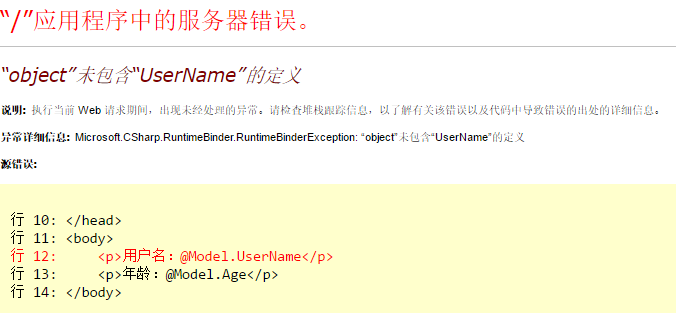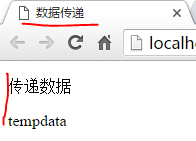ASP.NET MVC中Controller向view传值的方式:
- ViewBag、ViewData、TempData
- 单个值的传递
- Json
- 匿名类型
- ExpandoObject
- Cookie
- ViewModel(向普通View页面传个Model对象、向强类型页面传一个Model对象、用一个ViewModel对象解决所有问题)
ASP.NET MVC中view向Controller传值的方式
- QueryString
- RouteData
- Model Binding(form、使用和Action参数同名的变量进行传递)
- Cookie
在MVC中ViewBag的作用是数据的传递。在MVC3开始,视图数据能够通过ViewBag属性访问。在MVC2中则是使用ViewData。MVC3中保留了ViewData的使用。ViewBag是动态类型的(dynamic),ViewData是一个字典型的(Dictionary)。
MVC3中ViewBag和ViewData的差别:
ViewBag不再是字典的键值对结构,而是dynamic动态类型的。 它会在程序执行的时候动态解析。
所以在视图中获取它的数据时候不须要进行类型转换
| ViewData | ViewBag |
| 它是Key/Value字典集合 | 它是dynamic类型对像 |
| 从Asp.net MVC 1 就有了 | ASP.NET MVC3 才有 |
| 基于Asp.net 3.5 framework | 基于Asp.net 4.0与.net framework |
| ViewData比ViewBag快 | ViewBag比ViewData慢 |
| 在ViewPage中查询数据时须要转换合适的类型 | 在ViewPage中查询数据时不须要类型转换 |
| 有一些类型转换代码 | 可读性更好 |
View向Controller中传递数据的方式
QueryString
View中代码:
<div>
<button id="btn">提交</button>
</div>
<script>
$(function () {
$('#btn').click(function () {
//url不区分大小写
location.href = "/home/getvalue?method=querystring";
});
});
</script>
Controller中代码:
public void GetValue()
{
//Request属性可用来获取querystring,form表单以及cookie中的值
var querystring = Request["method"];
}
使用querystring向后台传递属于http协议中的get方式,即数据会暴露在url中,安全性不高(可通过浏览器历史记录看到发送的数据)且传递的数据量有大小限制。
点击提交按钮后浏览器地址栏中的地址:http://localhost:57625/home/getvalue?method=querystring。程序执行结果如下:

RouteData
路由可以让我们写出可读性较高的url,使用路由传递数据,首先要配置合适的路由:
routes.MapRoute(
name: "Default",
url: "{controller}/{action}/{id}"
);
前端代码只需要将location.href的值改为和路由匹配的url即可,本示例中为"/home/getvalue/100"
Controller中的代码:
public void GetValue()
{
var value = RouteData.Values["id"];
}
获取的值是object类型:

获取路由参数的另外一种方式是给Action设置一个和路由模板中指定的参数名一致(不区分大小写)的参数即可,代码如下:
public void GetValue(int id)
{
}
注意,这里不仅获取了路由数据,而且自动将数据类型转换为int类型:

ModelBinding
1. Form
form表单形式是常见的向后端发送数据的方式,但是在提交数据是只会提交form表单内部具有name属性的input,textarea,select标签的value值。
View中的代码:
<form action="/home/getvalue" method="post">
<input type="text" name="username" />
<input type="text" name="age" />
<input type="submit" name="button" value="提交" />
</form>
Controller中的代码:
public void GetValue()
{
var name = Request["username"];
var age = Request["age"];
var btn = Request["button"];
}
获取到的数据均为string类型:

现在我们创建一个和form表单对应的类:
public class User
{
public string UserName { set; get; }
public int Age { set; get; }
}
修改Action的代码如下:
public void GetValue(User user)
{
}
然后运行程序,可以看到MVC以将表单中的数据映射为User类实例的属性值,且进行了相应的数据类型的转换。

2. 使用和Action参数同名的变量进行传递
View中的代码:
<button id="btn">传递数据</button>
<script>
$(function () {
$('#btn').click(function () {
$.ajax({
'type': 'post', 'url': '/home/getdata',
//传递的数据也可以是序列化之后的json格式数据
//如,上面使用form表单提交数据就可以使用jquery中的serialize()方法将表单进行序列化之后在提交
//data:$('#form').serialize()
'data': { username: '雪飞鸿', age: '24' },
error: function (message) {
alert('error!');
}
});
})
})
</script>
Controller中的代码:
public void GetData(string username, int age)
{
}
在Action中成功获取到了对应的参数值,且数据类型也根据Action中参数的类型进行了相应的转换。
这里引用jquery.cookie插件来进行cookie的操作
<body>
<button id="btn">提交</button>
<script>
$(function () {
//向cookie中写入值
$.cookie('key', 'jscookie');
$('#btn').click(function () {
location.href = "/home/getvalue";
});
})
</script>
</body>
public void GetValue()
{
var cookie = Request["key"];
}

Controller向View中传值
单个值的传递
public ActionResult Index()
{
//注意,传递的值不能是string类型,否则会执行View(string viewName)方法而导致得不到正确结果
return View(100);
}
<body> <p>@Model</p> </body>

Json
public ActionResult Index()
{
return View();
}
public JsonResult SendData()
{
return Json(new { UserName = "雪飞鸿", Age = 24 });
}
<!DOCTYPE html>
<html>
<head>
<meta name="viewport" content="width=device-width" />
<script src="~/scripts/jquery-1.10.2.min.js"></script>
</head>
<body>
<p id="message"></p>
<button id="btn">获取数据</button>
<script>
$(function () {
$('#btn').click(function () {
$.ajax({
'url': '/home/senddata', 'type': 'post',
success: function (data) {
$('#message').html('用户名:' + data.UserName + "<br/>年龄:" + data.Age);
},
error: function (message) {
alert('error:' + message.statusText);
}
});
});
});
</script>
</body>
</html>

匿名类型
public ActionResult Index()
{
//使用匿名类向View中传递数据
return View(new { UserName = "雪飞鸿", Age = 24 });
}
<!DOCTYPE html>
<html>
<head>
<meta name="viewport" content="width=device-width" />
</head>
<body>
<p>用户名:@Model.UserName</p>
<p>年龄:@Model.Age</p>
</body>
</html>
因为匿名类型的类型名由编译器生成,并且不能在源代码级使用。所以,直接使用匿名类型向View中传递数据,在前台页面是无法访问到匿名类型中的属性的。执行上面代码程序会出现错误:

针对上述问题,使用Newtonsoft将匿名类型转换为json格式即可解决该问题。
使用NuGet引入Newtonsoft.Json包,然后修改代码如下:
public ActionResult Index()
{
string json = JsonConvert.SerializeObject(new { UserName = "雪飞鸿", Age = 24 });
//也可以直接序列化JSON格式的字符串
//dynamic jsonObj = JsonConvert.DeserializeObject("{ UserName : "雪飞鸿", Age : 24 }");
dynamic jsonObj = JsonConvert.DeserializeObject(json);
return View(jsonObj);
}

ExpandoObject
上面提到,直接使用匿名类型向View中传递数据是行不通的,可以使用ExpandoObject类型对象来替代匿名类型
public ActionResult Index()
{
dynamic user = new ExpandoObject();
user.UserName = "雪飞鸿";
user.Age = 24;
return View(user);
}

ViewBag、ViewData、TempData
public ActionResult Index()
{
ViewBag.Title = "数据传递";
ViewData["key"] = "传递数据";
//默认情况下TempData中的数据只能使用一次
TempData["temp"] = "tempdata";
return View();
}
<!DOCTYPE html>
<html>
<head>
<meta name="viewport" content="width=device-width" />
<title>@ViewBag.Title</title>
</head>
<body>
<p>@ViewData["key"]</p>
<p>@TempData["temp"]</p>
</body>
</html>

ViewModel
通过视图模型将数据传递到前端
//视图模型
public class User
{
public string UserName { set; get; }
public int Age { set; get; }
}
//Action
public ActionResult Index()
{
User user = new User() { UserName = "雪飞鸿", Age = 24 };
return View(user);
}
@* 设置页面为强类型页面 *@
@model DataTransfer.Controllers.User
@{
Layout = null;
}
<!DOCTYPE html>
<html>
<head>
<meta name="viewport" content="width=device-width" />
</head>
<body>
<p>用户名:@Model.UserName</p>
<p>年龄:@Model.Age</p>
</body>
</html>

public ActionResult Index()
{
Response.SetCookie(new HttpCookie("key", "cookie"));
return View();
}
<body>
<p id="message"></p>
<script>
$(function () {
var message = $.cookie('key');
$('#message').text(message);
})
</script>
</body>

